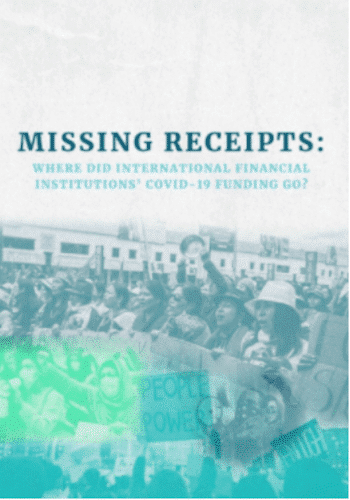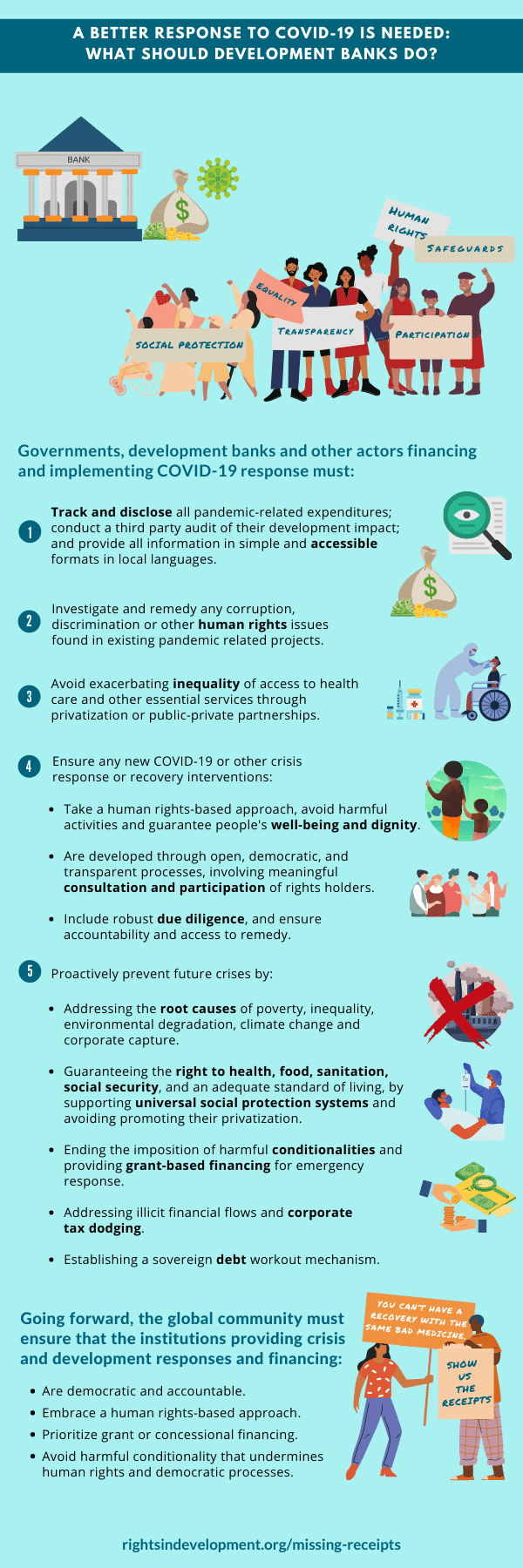
International Financial Institutions (IFIs) have designated billions of dollars to respond to the pandemic and related social and economic crises. Yet, there is a concerning lack of transparency on how these funds were spent and serious doubts on whether they have reached those who needed them the most.
Since the beginning of the pandemic, civil society groups worldwide have warned about possible risks of corruption, increased inequality, and mounting debt. Now, there is growing evidence that many of these risks have materialized.
“Missing Receipts” is a new collaborative research project that analyzes IFIs’ role – and their failings – in the pandemic recovery. The report, based on a series of global and national level case studies, was developed by members and partners of the Coalition for Human Rights in Development.
Key Findings
The cases analyzed in “Misplaced Trust” show that:
- It is difficult to know what IFI funds were part of the COVID-19 response and how they have been utilized at the national and local level. For the most part, both IFIs and governments have failed to track and communicate this data accurately, if at all.
- Many IFIs utilized a rapid disbursement window, or “fast-tracking”, at the same time as governments in many countries were waiving environmental impact assessments and regulations, as well as consultation requirements. While shortening disbursement timelines for emergency response can be justified, due diligence, especially regarding human rights impacts, remains essential. Researchers, however, found that socio environmental risk ratings for projects were often missing or under assessed.
- In a context where many governments were actively suppressing information about the pandemic and restricting freedom of the press and civic watchdog groups, as highlighted in the Coalition’s report “Unhealthy Silence“, IFIs failed to ensure a basic degree of transparency and participation. Not only did IFI-financed programs fail to consult with the public at large and with those most vulnerable to the pandemic, but in multiple cases they excluded health experts and medical associations, resulting in adverse impacts on health and safety as well as accountability.
- IFI support for social protection was only a fraction of overall support, and insufficient to meet the need, while a disproportionate amount of IFI funds went to benefit the private sector.
- While many IFIs stressed the need to target “the most vulnerable”, in many cases these programs were designed without sufficient attention to ensuring universality and accessibility, leaving out marginalized groups and often those most susceptible to the effects of the crisis, including: informal workers, women, migrants, persons with disabilities, and Indigenous Peoples.
- In many countries, the state of emergency together with the lockdown restrictions created the perfect conditions for malfeasance and corruption. This was exacerbated by the lack of transparency from both governments and IFIs, and the failure of IFIs to include effective monitoring mechanisms.
- IFIs’ neoliberal prescriptions made countries more vulnerable to the pandemic, yet the institutions continue to push policy reforms and conditionalities that harm those living in poverty or otherwise marginalized. Today IFIs vigorously promote the “private sector first” paradigm, focusing on leveraging private investment rather than supporting countries in rebuilding state capacity.
- IFI loans have contributed to skyrocketing public debt for developing and middle income countries. In order to meet debt obligations, governments are increasingly adopting austerity measures and cuts to social spending.

“The World Bank used the COVID-19 pandemic to advance its social protection agenda, by replacing the idea of universal entitlements with highly targeted, short-term grants that do not address the root causes of poverty”

Stay in Touch
